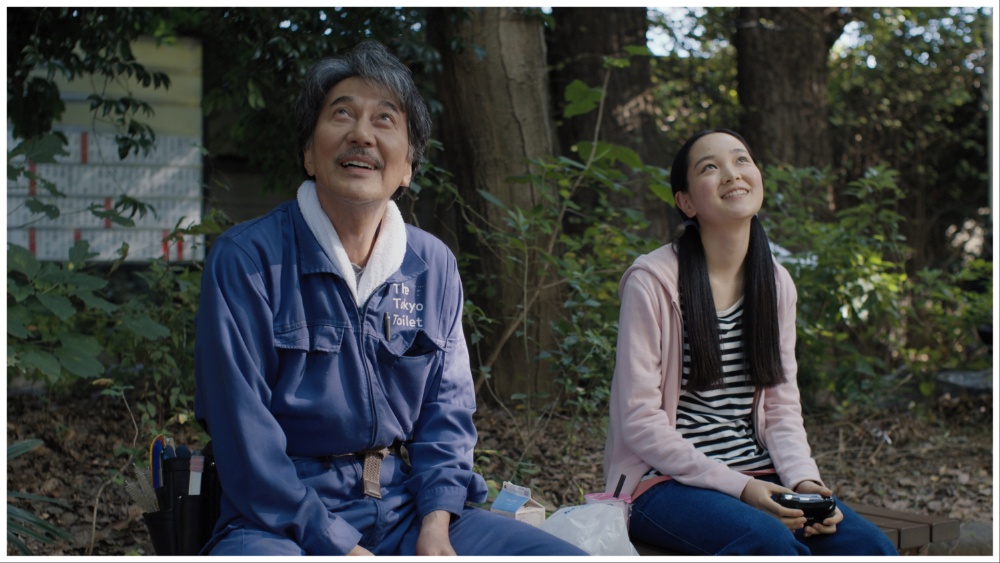
Before you ask, yes, Lou Reed’s rock standard “Perfect Day” does indeed make an appearance in Wim Wenders’ “Perfect Days”: on the protagonist’s stereo as suitably ideal sunlight pours into his small, neat Tokyo apartment, before swarming the soundtrack as we head out into the city on a calm weekend afternoon. If that sounds a little obvious, basic even, said protagonist Hirayama — a mellow, soft-spoken toilet cleaner beautifully played by Kōji Yakusho — would probably agree with a shrug. He’s into simple pleasures, not deep cuts. His solitary life is built around the things that make him happy and the work that keeps him solvent. He’s not inclined to wonder what other people make of it. Wenders’ film, in turn, is sincere and unassuming, and owns its sentimentality with good humor.
“Perfect Days” finds its maker in bracing, uncomplicated form: It hasn’t the ecstatic spiritualist philosophy of “Wings of Desire” or the penetrating poetry of human and cultural desolation that marked “Paris, Texas.” But the new film’s humane, hopeful embrace of everyday blessings is enough to make it Wenders’ freshest, most rewarding and arthouse-friendly fiction feature in close on 30 years — following a 21st-century run of dusty or disheveled works dwarfed by the artistry and elan of his recent documentary work. As it happens, “Perfect Days” bows in Cannes mere days after the director’s dazzling 3D art doc “Anselm.” Rather than one showing the other up, both pleasingly demonstrate the range of forms, scales and tones in which the 77-year-old filmmaker can still work.
Indeed, there’s something of a documentarian’s eye to the film’s patient examination of process and routine, as it follows Hirayama on his daily rounds with minimal fuss or incident. Beginning with the first blush of orangey morning light on his sleeping mat — captured by DP Franz Lustig as a slice of mimosa-bright intensity amid the drear — we observe as the sixtysomething man folds up his bedding, brushes his teeth, dresses, waters his collection of potted sapling trees, and hops into a small van filled with all his cleaning materials. He picks a cassette tape from the many stashed above the windscreen, and putters along the highways of Tokyo to the jangling strains of The Animals’ “House of the Rising Sun.” Again, his musical selections don’t shy from the literal.
Hirayama has a fixed cleaning rota, shared with younger slacker colleague Takashi (Tokio Emoto), that covers the public toilets in the city parks of the Shibuya ward. “Perfect Days” began life as a short film project, commissioned by Japanese urban authorities, intended to celebrate their state-of-the-art public toilet system — and as far as Wenders’ feature has drifted from that brief, it still permits us ample time to marvel at a variety of architect-designed, art-adorned tinkle temples. They are largely taken for granted by their caught-short customers, as is Hirayama himself, used to being silently brushed past as if he, too, were a mere facility.
If he minds his job, however, it doesn’t show on his creased, still keen-eyed face. He appears to take pleasure in its methodical regularity, just as he enjoys his daily lunch breaks in the same outdoor spot — where he photographs the same trees and smiles at the same strangers — and his daily post-work drink at the same busy commuter bar. When one day is complete, Wenders takes us through the schedule all over again; weekends, with bicycle trips to the laundromat, the bookshop and a hole-in-the-wall restaurant run by cheerfully nurturing Mama (Sayuri Ishikawa), are different but just as contentedly regimented.
The variations come in the cultural fabric of Hirayama’s leisure time: the books he reads (Patricia Highsmith one day, William Faulkner another) and the music that he picks from his large collection of classic rock and soul — Patti Smith, Otis Redding, Van Morrison, Nina Simone — all on cassette. (His is a stubbornly analog existence, to the amusement of his juniors.) But when Niko (Arisa Nakano), the teenage daughter of his estranged sister Keiko (Yumi Aso), turns up unannounced on his doorstep and decides to stay a few days, the ensuing disruptions to his routine also expose what a deliberate construction that routine is in the first place: a defense against a past life he doesn’t want back.
We’re left to intuit much of this through the small sighs and pauses in Yakusho’s graceful performance, with his unhurried but purposeful gait, and his taciturn but open-faced demeanor. He and his director alike resist condescending to the character as they etch in the tightly managed confines of his existence. Monochrome dream sequences by Wenders’ wife Donata — drawing on the Japanese concept of komerebi, or the play of light in trees — allude to Hirayama’s equally peaceful but poetically-inclined inner life.
Such touches can border on the corny. The theme of seeking beauty in the mundane — well served by Lustig’s boxily framed but expansively lit tableaux of urban development and domestic space — is at no risk of understatement. But here and there, “Perfect Days” startles with flourishes of more stoic lyricism and disciplined emotional torment: A later surprise family reunion is heart-rending in its brief, unspoken flash of shared anguish, while a charged encounter with a stranger culminates in a literal shadow-dance of unbidden, childlike playfulness. This beguiling film may trade in the tranquil security of routine, but makes an occasional, heart-quickening case for the unexpected.













